Press releases
Maritime affairs
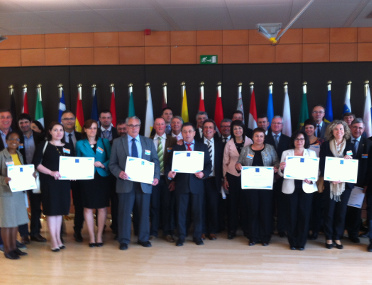
European Manifest for Sustainable Nautical Tourism
29/04/2014
Commissioner Damanaki attended today the public event on Nautical Tourism organised by the Committee of the Regions of the European Union and the European Federation of Nautical Tourism Destinations (FEDETON). She also joined the ceremony of the Signature of the European Manifest for Sustainable Tourism.
This Manifest is a commitment to promote nautical tourism while including the principles of sustainable development. It brings together public administrations, businesses and civil society. Numerous Mayors attended the ceremony and signed the Manifest.
Nautical tourism is a growing segment of coastal and maritime tourism which needs to be developed in a sustainable way in order to avoid potential negative impacts on the environment. In the Strategy for Coastal and Maritime Tourism ![]() tabled earlier this year, we proposed to develop coastal tourism while safeguarding the environment. For instance, nautical sports are an important opportunity to diversify coastal tourism and are already pursued by many regions nowadays.
tabled earlier this year, we proposed to develop coastal tourism while safeguarding the environment. For instance, nautical sports are an important opportunity to diversify coastal tourism and are already pursued by many regions nowadays.
Read more about Coastal and Maritime Tourism here.
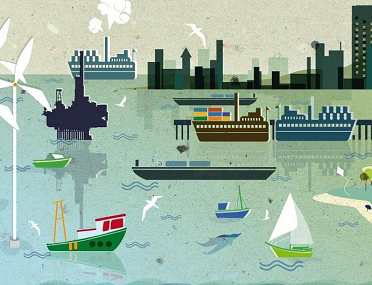
Maritime Spatial Planning legislation adopted by the Parliament
17/04/2014
The European Parliament endorsed on April 17th a Directive for Maritime Spatial Planning which should help Member States develop plans to better coordinate the various activities that take place at sea, ensuring they are as efficient and sustainable as possible. In coastal and maritime areas, many activities compete for the same space and resources: fishing grounds, aquaculture farms, marine protected areas exist alongside maritime infrastructures such as cables, pipelines, shipping lanes and oil, gas and wind installations. The new Directive will help avoid potential conflicts between such diverse uses and create a stable environment attractive to investors, thereby contributing to sustainable growth.
With rapidly increasing demand for maritime space for new activities, from renewable energy to aquaculture installations, better and coherent planning of maritime activities at sea is indeed needed. The Directive sets minimum requirements for the drawing up of national maritime spatial plans. These plans will identify all existing human activities, taking into account land-sea interactions, and the most effective way of managing them. As many of the activities run across national borders, the Directive will help Member States co-operate better.
Commissioner Damanaki jointly stated together witht Commissioner Potočnik: "Today's vote in the European Parliament is an important step in creating new growth opportunities across all maritime sectors by better managing our seas and ensuring their sustainability. Only if we coordinate the various activities taking place in our seas can we make access to maritime space more predictable for investors and at the same time reduce the impact of maritime activities on the environment."
Maritime Spatial Planning (MSP) is a cornerstone of the Commission's Blue Growth strategy and of the EU Integrated Maritime Policy. It allows improved understanding of the distribution of marine resources and offers investors greater certainty about potential economic development. With MSP, operators will know what, where and for how long an activity can take place. Maritime Spatial Planning will also reduce existing over-regulation and administrative complexity. For instance, in some countries up to nine executive agencies need to be contacted before securing a permit for an offshore aquaculture site. Better coordination will speed up procedures which will generate economic gains. For instance by accelerating investments in offshore aquaculture or renewables by 1, 2 or 3 years, economic gains from €60 million to over €600 million could be generated by 2020.
Maritime Spatial Planning will also contribute to a more efficient implementation of EU environmental legislation in marine waters and will help Member States reach good environmental status of their waters by 2020. It should help establish coherent networks of Marine Protected Areas, for which cooperation on planning across borders is essential, and ensure the participation of all stakeholders in planning processes.
Once finally adopted by ministers, Member States must transpose the Directive into their national legislation by 2016 and nominate the Competent Authority in charge of the implementation of MSP. Member States must also draw up their national maritime spatial plans by 2021. They are free to tailor the content of the plans and strategies to their specific economic, social and environmental priorities, and their national sectorial policy objectives and legal traditions, but must respect the minimum requirements of the Directive.

Last plenary session of the 7th legislature of the European Parliament starting today
14/04/2014
Starting today in Strasbourg, the last plenary session of the current European Parliament will see two major fisheries files on its agenda. Members of the European Parliament will be called to vote on the Directive on Maritime Spatial Planning as well as on the political agreement over the European Maritime and Fisheries Fund.

Fisheries Committee adopted the trialogue agreement on EMFF
07/04/2014
Following the political agreement reached between the European Parliament and the Council in January, the Fisheries Committee of the European Parliament today voted in favour of the European Maritime and Fisheries Fund (EMFF). 16 MEPs voted in favour, 2 voted against and 0 abstained.
The vote by the Fisheries Committee is a positive step ahead of next week's vote in the plenary session of the Parliament and towards the EMFF coming into force later this year to support the implementation of the reformed Common Fisheries Policy (CFP).
Fisheries
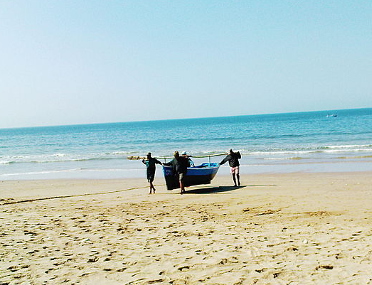
European Commission regrets delay in ratification process of EU - Morocco Fisheries protocol
28/04/2014
Commissioner Damanaki's Spokesperson, Helene Banner, stated today: "After a very long and complicated negotiating process, the EU completed its internal ratification of the protocol to the EU-Morocco Fisheries Partnership Agreement on 16 December 2013. Our fishermen, whose activity under this agreement has been suspended since December 2011, have been waiting eagerly for this agreement to come into force. The lack of completion by Morocco of its own internal ratification process, preventing the fishing activity to resume, is regrettable. We look forward to the completion of the ratification process by Morocco as soon as possible so that this protocol can be put into effect."
The last protocol under the fisheries agreement with Morocco has been terminated in December 2011. Following a lengthy and arduous negotiation process, a new protocol approved by EP and Council was signed at the end of 2013. Entry into force has been delayed until now, pending ratification of the protocol by Morocco.
Read further information on the EU’ fisheries partnership agreements here.
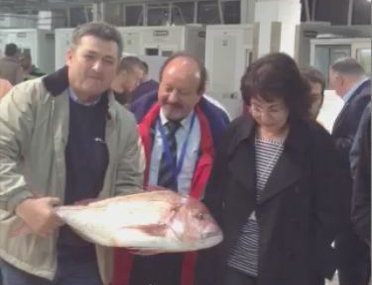
Commissioner Damanaki's visit to Piraeus Fish Market
28/04/2014
Commissioner Damanaki visited the Fish Auction House of Piraeus in the early hours of Saturday. At the opening of the Fish market at 01:00 am, she witnessed the whole process of fish and seafood landed and then auctioned to fishmongers. The visit was also an opportunity to interact with local sellers as well as all actors from the sector, from port authorities to the Head of the Auction House.

EU and Senegal agree on new sustainable fisheries partnership
25/04/2014
The European Union and the Republic of Senegal have agreed a new Fisheries Partnership following a successful third round of talks in Dakar, Senegal, on the 24th and 25th April. The five year Protocol fixes the fishing opportunities for EU vessels, the EU's financial contribution, and the terms of support for the Senegalese fisheries sector.
Eight years after the expiry of the last protocol, the new instrument allows 38 vessels targeting mainly tuna to once again operate in the Senegalese Exclusive Economic Zone (EEZ), subject to a compensation of 8 690 000 € for the whole period of the new agreement. The Protocol is in strict compliance with the principles of sustainability and good governance, and is viewed as value for money by both Parties.
Commissioner Damanaki said: "Senegal is a key partner because of its strategic location, the high volume of fish landed in the port of Dakar, its role as a member of ICCAT and especially its growing commitment to the fight against illegal fishing. This agreement benefits all stakeholders, including local artisanal fishermen. As one of the new generation of Sustainable Fisheries Partnership Agreements, this deal underlines Europe's commitment to the principles of the reformed CFP whether at home or in foreign waters."
Artisanal fisheries, essential for the economy of Senegal, will not only benefit in terms of scientific research and the fight against IUU fishing, but will also receive a significant part of the sectorial support built into the agreement, worth 750 000 € per year.
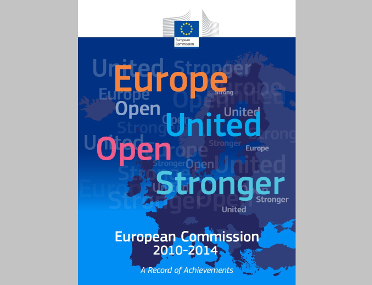
European Commission's Record of Achievements for 2010-2014
25/04/2014
"A United, Open and Stronger Europe", the 2010-2014 Record of Achievements of the European Commission has been published. The Record comes back on the achievements of the past five years, during which Europe witnessed an unprecedented crisis that brought many changes. Europe nevertheless managed to remain "united", as we all stand together, "open" as we worked with our international partners and "stronger" as we are now implementing economic reforms and reinforcing EU's economic governance.
The past five years have brought a new turn to European fisheries: a historic reform is now being implemented, putting sustainability at its core and ensuring that we have more fish in the sea and on our plate, while guaranteeing more income for our fishermen and fish farmers. Also, we have now turned our seas and our blue economy into a source of growth and prosperity.
Dowload the Record achievements here ![]() . Read more about achievements on Fisheries and Maritime Affairs as of page 42.
. Read more about achievements on Fisheries and Maritime Affairs as of page 42.

European Commission on Iceland's announcement of mackerel quota for 2014
23/04/2014
Commissioner Damanaki's Spokesperson, Helene Banner, stated today: "Iceland's announcement of its unilateral mackerel quota is a positive step. It conforms to the share figure it had previously claimed in the Coastal State mackerel negotiations, namely, 11.9% of 1,240,000 tonnes. The EU has said from the outset that the door is open for Iceland to join the arrangement, and we could now be very close to reaching a deal which includes all four Coastal States: the European Union, the Faroe Islands, Norway and Iceland. We therefore urge Iceland to join the other three Parties at the negotiating table at the earliest opportunity so that we can work out the terms of a full four-Party Coastal State arrangement for mackerel."
Iceland announced on Tuesday 22nd April its 2014 mackerel quota of 147,574 tonnes. Three Coastal States (EU, Faroe Islands and Norway) agreed in London on a five-year arrangement for mackerel on 12 March 2014. This arrangement established a number of important principles, including a commitment to sustainable fisheries, a sharing between the Parties, and a commitment to establish a new long-term management plan in 2014 following ICES advice. Regrettably, Iceland was unable to come on board at that time. However, the arrangement made room for it to join at a later stage.

Meeting with members of fishmongers' association of Attica region
21/04/2014
Commissioner Damanaki has exchanged views last week on the challenges and opportunities of fisheries for the region of Attica with members of the region's fishmongers' association Skorpios. It has been the occasion for Commissioner Damanaki to reiterate her commitment towards sustainable fisheries and to discuss the reformed Common Fisheries Policy. She further raised awareness on the negative impact on stocks of the consumption of juveniles, in the framework of Inseparable, the awareness campaign launched earlier this year calling consumers, fishmongers and retailers to Eat, Buy, and Sell sustainable fish.
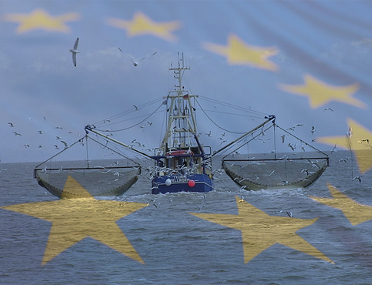
Commissioner Damanaki welcomes Parliament's adoption of new EMFF
17/04/2014
The European Parliament has endorsed on April 16th the European Maritime and Fisheries Fund (EMFF) with an overwhelming majority. With a budget of €6.5 billion for 2014-2020, the fund will finance projects to implement the new reformed Common Fisheries Policy (CFP) and provide financial support to fishermen, fish farmers and coastal communities to adapt to the changed rules. The Fund will also finance projects to boost "blue" growth and jobs under the EU's Integrated Maritime Policy (IMP).
Commissioner Damanaki, welcomed the adoption: "Our reformed fisheries policy is putting European fisheries on a sustainable footing once and for all. To get there will mean radical changes for our fishermen and the whole sector, which needs our financial support. We will co-fund concrete projects in the Member States to help fishermen and coastal communities develop a sustainable seafood industry - from the net to the plate."
Funding sustainable fishing
With the reform of its Common Fisheries Policy (CFP), the EU has acted against overfishing and the practice of throwing unwanted fish back in the sea. The new EMFF will provide investment and funding opportunities for fishermen, fish farmers and coastal communities to contribute to reducing the impact of fisheries on the marine environment and to rebuild fish stocks. Crucially, by financing more selective fishing gear for instance, the fund will also help eliminate wasteful discarding practices – a key aspect of the new policy.
No EU money will be spent on the building of new fishing vessels or other initiatives which would contribute to increasing fishing capacity. The priority is rather to help small-scale fishermen, who will benefit from a higher rate of aid intensity, as well as young fishermen and fishermen's families. The Fund will also help fish-farmers become more competitive by supporting them to reach out to new markets. The EMFF will thus help ensure a stable supply of sustainable seafood products for consumers, boost innovation, help communities to diversify their economies, finance projects that create new jobs, and ultimately improve quality of life along European coasts.
In addition, it will also fund fisheries data collection to allow decisions to be based on robust evidence, and reinforce the fisheries control programmes to ensure that the rules on responsible and sustainable fishing are respected and complied with by all. The fund will also support the regionalised policy-making of the new CFP and allow all stakeholders to fully participate.
Boosting blue growth
For the first time, the fund will also boost the Integrated Maritime Policy by facilitating coordination across borders and across sectors. Funding will focus on those initiatives that benefit various sectors across the board but cannot be accomplished by any single sector-based policy or single Member State such as maritime spatial planning, integrated maritime surveillance and marine knowledge.
Next steps
After today's vote in the European Parliament, the Fund will now go to Fisheries Ministers in the Council for final adoption which will allow the EMFF to come into force in June this year.
The EMFF will co-finance projects alongside national funding streams with each Member State receiving a share of the total budget. Member States will draw up their national operational programmes, specifying how they intend to spend the money allocated and, once approved by the Commission, the national authorities will decide which projects they wish to support.
Read further information on the European Maritime and Fisheries Fund here and the Questions and Answers here.
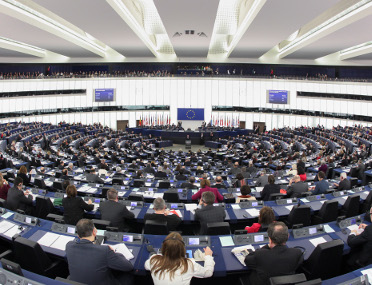
European Parliament agrees to Fisheries Partnership Agreements with Comoros, Madagascar and Seychelles
16/04/2014
The European Parliament today gave its consent to the EU’s Fisheries Partnership Agreements with Comoros, Madagascar and Seychelles.
In Fisheries Partnership Agreements, the EU gives financial and technical support in exchange for fishing rights. All three agreements will allow EU vessels mainly from Spain, Portugal, France and Italy to fish in the waters of Comoros, Madagascar and Seychelles and are part of the tuna network fisheries agreements in the Indian Ocean.
Read further information on Fisheries Partnership Agreements here.
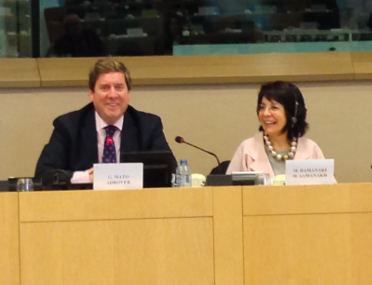
Fisheries Committee’s role in making the EU's maritime and fisheries policy more sustainable
10/04/2014
Commissioner Damanaki today underlined the key role the Fisheries Committee of the European Parliament played in shaping the reform of the EU’s Common Fisheries Policy and in paving the way for a European maritime policy in the past five years.
She attended the final meeting of the Committee ahead of the elections on May 25th. Commissioner Damanaki thanked chairman Gabriel Mato Adrover for having put the principle of sustainability at the core of EU fisheries policies.
Earlier this week, the Committee had already endorsed the European Maritime and Fisheries Fund (EMFF) ahead of the final vote at next week’s plenary session in Strasbourg. Another key vote scheduled for next week will take place on Maritime Spatial Planning.

Commissioner Damanaki welcomes deal on multi-annual plans
03/04/2014
Negotiators of the European Commission, the European Parliament and the Council on April 2nd reached an agreement on a pragmatic way forward for the development and adoption of multiannual plans. Commissioner Damanaki welcomed the agreement, which concludes the work of the inter-institutional Task Force and opens the way to restart work on multiannual plans, which are a core element of the new Common Fisheries Policy.
The agreement allows the Commission to table proposals for multiannual plans which reflect the long-term approach agreed in the reformed Common Fisheries Policy. The Commission will also review pending proposals for multiannual plans in light of the conclusions of the Task Force.
Fisheries should be managed by means of multiannual plans to ensure sustainable resource management, and high and stable catches. These plans build on the objectives of the CFP and set the target and the deadlines to reach them. The new generation of plans will also be a vehicle for regionally-designed measures to achieve the targets of the plan.
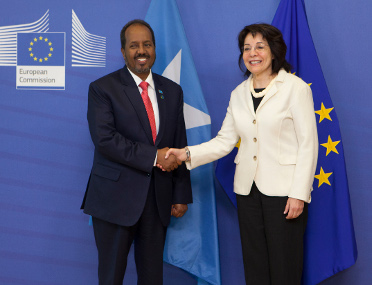
Commissioner Damanaki meets Somalian President, Mr Hasan Sheikh Mohamoud
03/04/2014
Commissioner Damanaki has met today with the President of Somalia, H.E Mr Hasan Sheikh Mohamoud. The President was accompanied by H.E Mr Abdirahman Dualeh BEILEH, Minister for Foreign Affairs and International Cooperation, Mr. Hussein Abdi HALANE Minister for Finance, Mr Said Abdullahi MOHAMED, Minister for Planning as well as Mr Mohamed Olow BARROW, Minister of Fisheries and Marine Resources. The meeting was held in the margins of the EU-Africa Summit taking place in Brussels.
It focused on the management and the governance of fisheries in Somalia as well as on fight against piracy. Somalia has an estimated coastline of 3333km legnth and is considered as the longest coastline of Africa. The potential for fisheries is considerable though currently untapped.
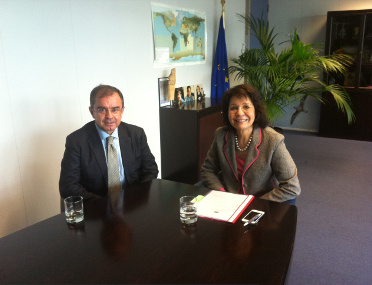
Discussing cooperation with Court of Auditors' Member Mr Milionis
02/04/2014
Commissioner Damanaki met with Mr Milionis, one of the new Members of the Court of Auditors, in Brussels on April 2nd. This exchange has been the occasion for Commissioner Damanaki to reiterate the importance of good and smooth cooperation with the Court, which is an essential institution within the European architecture.

Chinese President Xi Jinping’s address at the College of Europe in Bruges
01/04/2014
Commissioner Damanaki attended the keynote address of President Xi Jinping at the College of Europe in Bruges on April 1st where the Chinese President evoked EU-China relations. Commissioner Damanaki had a brief exchange with Xi Jinping in the framework of his address in Bruges.


